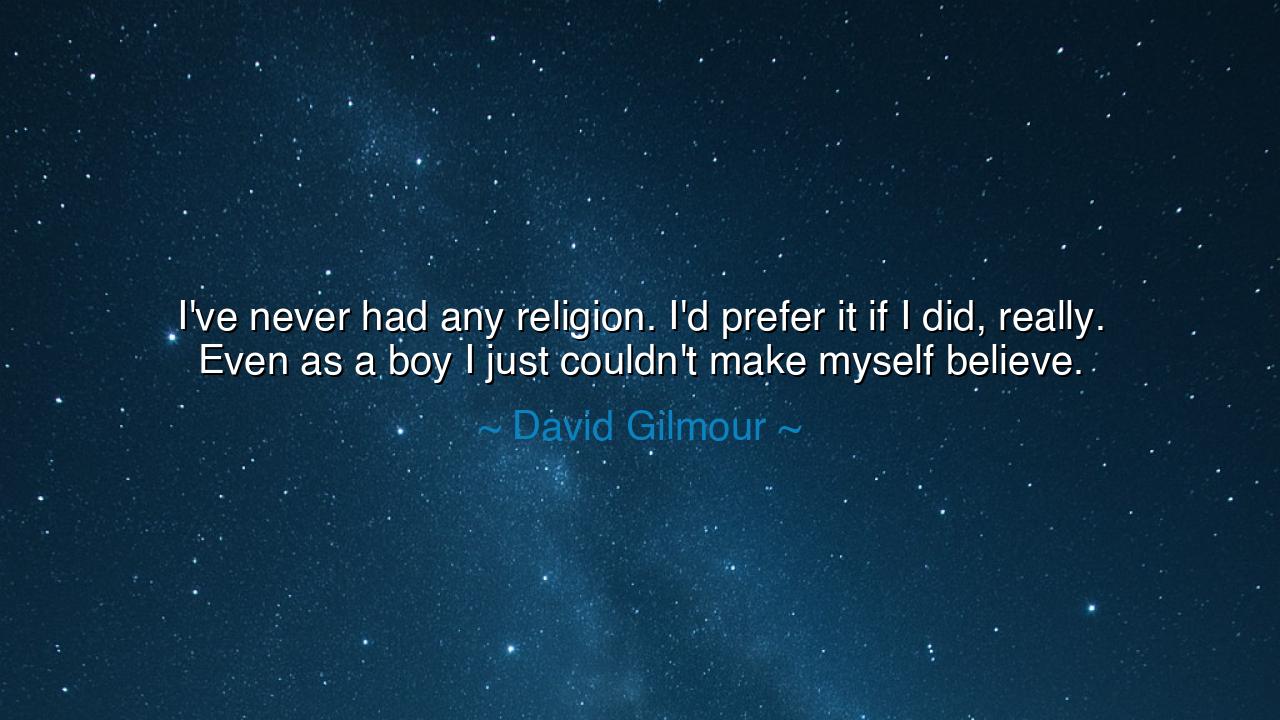
I've never had any religion. I'd prefer it if I did, really. Even
I've never had any religion. I'd prefer it if I did, really. Even as a boy I just couldn't make myself believe.






“I’ve never had any religion. I’d prefer it if I did, really. Even as a boy I just couldn’t make myself believe.” – David Gilmour
In these tender and introspective words, David Gilmour, the voice and soul of Pink Floyd’s ethereal sound, unveils a quiet confession—not of rebellion, but of longing. His statement is not the boast of an unbeliever, but the sorrowful admission of a seeker who has looked for faith and found silence. When he says, “I’d prefer it if I did,” we hear the ache of a heart that yearns for certainty, for the comfort that belief can bring. And yet, his honesty stands as a kind of faith of its own—a devotion to truth, even when that truth is absence.
The origin of these words can be traced to the lifelong tension between art and meaning that shaped Gilmour’s life and music. Born in postwar England, he came of age in a time when traditional religion had begun to fade beneath the light of science and the shadow of modernity. Like many of his generation, he inherited the stories of faith but not always the fire of belief. In the haunting melodies of Pink Floyd, one can feel this spiritual struggle—the search for transcendence in a world that seems indifferent. Gilmour’s words echo the sentiment of the modern soul: the yearning for something beyond reason, even when reason forbids belief.
To not believe is not always to reject the sacred; sometimes, it is to wait for it. Gilmour’s honesty reminds us that faith cannot be forced. True belief, like love, cannot be willed into being; it must arise naturally, from within. The ancients knew this well. The philosopher Epicurus, though not a man of religion, taught that the gods, if they existed, must dwell in peace, untouched by human fear or flattery. He did not deny the divine; he simply refused to pretend certainty where none could be found. Likewise, Gilmour’s words do not condemn belief—they confess the pain of not being able to feel what others seem to feel so easily.
And yet, in his art, Gilmour found another kind of spirituality—one made not of dogma, but of sound and emotion. Music, for him, became the language of the soul’s yearning. Through the soaring notes of “Comfortably Numb,” the dreamlike sorrow of “Wish You Were Here,” and the grand loneliness of “Echoes,” he built cathedrals not of stone, but of sound. In this way, he reveals a truth older than religion itself: that the search for the divine can take many forms. Where some pray with words, others pray with creation—with art, kindness, and courage.
Throughout history, many have walked this same path of doubt and wonder. Albert Camus, the philosopher of the absurd, wrote that man’s nobility lies not in certainty, but in perseverance without it. He urged humanity to live as though life were meaningful, even when its meaning could not be proven. Gilmour’s confession carries this same spirit. He does not mock religion; he admires it from afar, as a man might gaze at a fire he cannot quite reach. His longing for belief, paradoxically, becomes a form of reverence—a recognition that there is something holy in the very capacity to yearn.
The deeper wisdom of this quote lies in its humility. Gilmour’s words remind us that honesty is itself sacred. To admit uncertainty, to acknowledge the limits of our faith, is not weakness but integrity. There are those who proclaim belief loudly yet live without compassion, and there are others who cannot believe yet live with reverence for beauty, truth, and love. The latter, perhaps, are closer to the divine than they know. For what is faith, if not the willingness to continue seeking, even in darkness?
So, my child of the questioning heart, take this teaching as a mirror for your own soul. Do not fear doubt—it is the beginning of wisdom. If you cannot yet believe, then live beautifully. Let your actions be your prayer, your art your testament, your kindness your altar. Seek wonder in the sunrise, music in the silence, and holiness in the human spirit. Belief may not always come, but meaning can always be made. For, as Gilmour’s life and words teach us, even the one who cannot “make himself believe” can still live in awe, and in that awe, perhaps, touch something divine after all.






AAdministratorAdministrator
Welcome, honored guests. Please leave a comment, we will respond soon